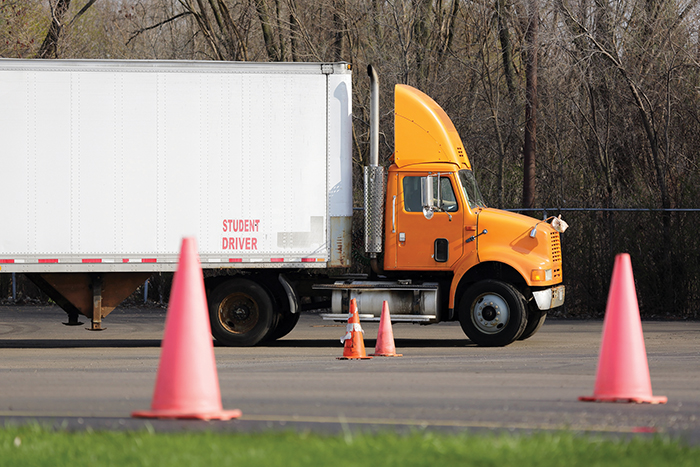7 things to consider when choosing a truck driver training school
The right truck driver training school can open the door to career opportunities. But a poor choice — even if it ultimately leads to a successful government road test — can leave students with little more than a piece of paper in their wallet, a gap in their bank account, and limited job prospects.
Here are seven factors to consider before registering for a course:

1. Job placements
Schools themselves can serve as a conduit to fleets that are hiring entry-level drivers.
Ask where students have been hired and contact the trucking companies to confirm that there is a relationship or at least some level of respect between the two organizations, says Rolf VanderZwaag, president and CEO of Techni-Com and author of several training manuals.
The promise of job placements after a course is completed is extremely important, he adds. “Many schools are simply in the business of helping students get a class A licence, rather than helping a person get started in a career. Avoid these schools.”
2. Online reviews and records
A bit of online research can offer insights into a training school’s past work. Look for student reviews and ensure the school is licensed to offer government-approved courses. Any notice, order or financial penalty based on previous violations could be a cause for concern.
3. Equipment and facilities
A positive training experience will require access to training resources. Ask potential schools about their student-instructor ratios, the type and age of equipment being used, and where the in-yard and on-road training is actually conducted. Some schools also use driving simulators to further enhance skills, which can help to ensure students are better prepared for lessons behind the wheel of an actual truck.
4. Professional development opportunities
Entry-level driver training, as the phrase suggests, is only the beginning. Learning is a lifelong experience. Ask the school about additional courses they offer. Some locations also provide specialized training in fuel-efficiency, dangerous goods, dispatching, business management, and occupational health and safety.
5. Commitments to safety
“My best advice would be to choose a school that emphasizes safety – not a great pass rate or quick entry into workforce,” says Anne Marie Hayes, a certified driving instructor and member of the Ontario Road Safety Forum.
Ask for a copy of safety abstracts – such as Ontario’s commercial vehicle operator’s registration (CVOR) – for the school and instructors who will provide the training. These records will identify details about inspection results, collisions, and convictions.
6. Pricing
Any training comes at a cost, but a promise of unusually cheap tuition might be too good to be true. “While it is tempting to choose lower tuition, proper training takes time and the most common way to lower tuition fees is to cut corners,” says VanderZwaag.
7. Location
A school’s location will have a role to play in training costs, so the one closest to home can help limit accommodation-related expenses. Just keep in mind that the quality of the training should ultimately be the deciding factor in any choice.
Have your say
This is a moderated forum. Comments will no longer be published unless they are accompanied by a first and last name and a verifiable email address. (Today's Trucking will not publish or share the email address.) Profane language and content deemed to be libelous, racist, or threatening in nature will not be published under any circumstances.
Sound advice, additionally avoid scheduling schools with aging equipment walk around their yard and eyeball trucks and trailers.
After 10 yrs of driver training, new student recruitment, I offer some additional considerations. Unless you have family or close friends in the industry, you have to do your research. Remember many so called “schools” are only taking your money so you can pass the road test. – NOT get a job. Your introduction and education in transport is an investment in yourself. Highly recommend taking a tour and visiting those carriers interested in hiring. In my experience with transportation since 1987 in various capacities; many carriers simply reject applications if training was done at a MELT licensing mill. Companies often will give you a road test and interview based on where you received your training. Ask the people who will be hiring you – where they recommend to go for training. I have countless first hand stories of people that threw away their tuition money only to find they can’t get a good job. Unfortunately transportation will have something for you – Driver Inc. This is a problem that needs to be hit hard – our lives on the road literally depend on it. As an Air Brakes instructor I often had students already working in the industry that would retake a quality course because they recognized they just didn’t know anything to be safe. Conducting road tests for various companies I was astonished with far too many applicants with a couple years of experience and their complete lack of basic trucking knowledge – and lack of skill. Again not hearsay, but firsthand experience – eg. Cannot identify a slack adjust or brake chamber, blank stare when asked to check for brake adjustment or anything to do with the air system. As for driving skills – Wow!
Enough complaining – how to fix it? Make driving a skilled trade. This will allow access to OSAP funding. Combine training with apprenticeship and certified colleges (private or community only and with strict overview and enforcement) Raise the standard of the road test- as long as it remains as is, the training will not improve – the “school” is only training you to pass the test – NOT get a job! Training at a good school costs more and will last longer. But may offer that additional training such as trip planning, transportation of dangerous goods, HOS, cargo securement and just more. This is what will make for a better new drivers resume and land that good job.